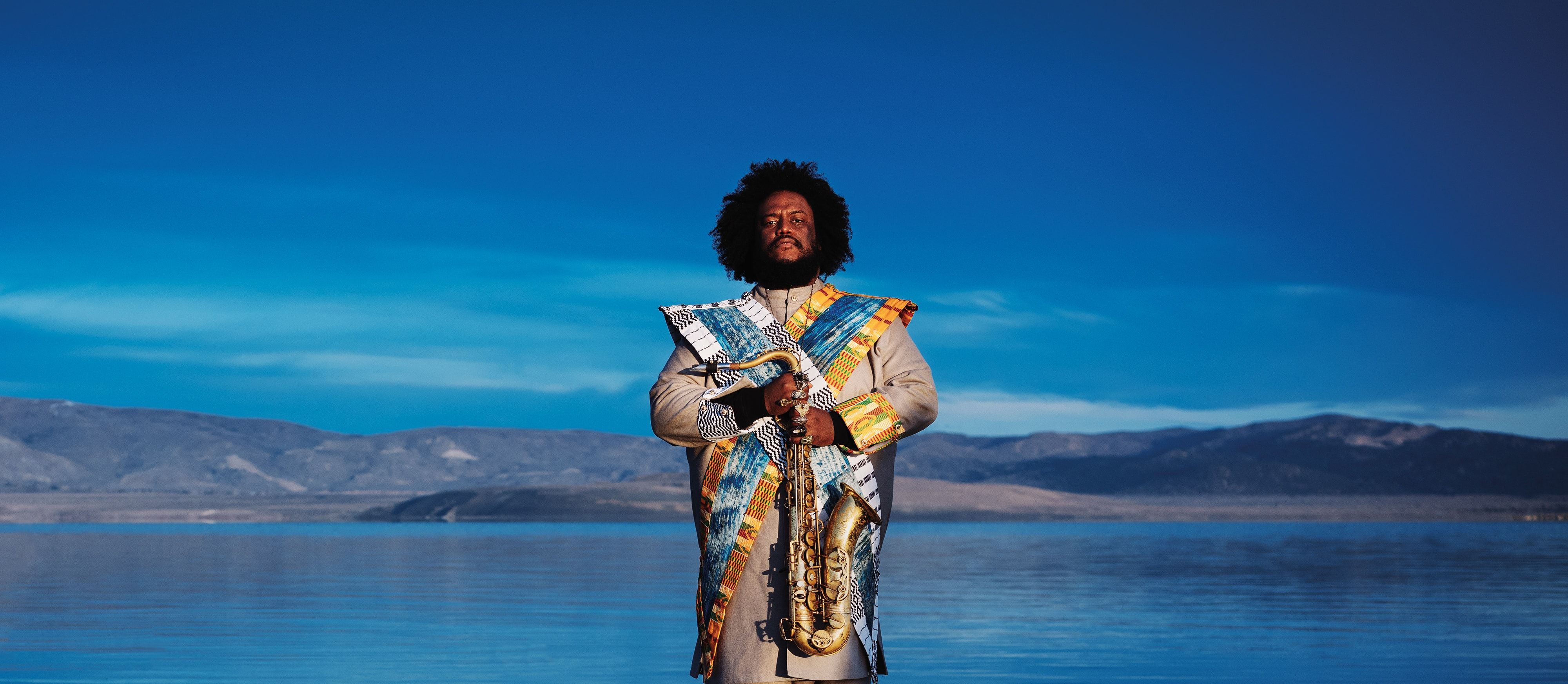Kamasi Washington releases full-length ‘Heaven and Earth’

Kamasi Washington
Heaven and Earth
Shoto Mas Inc. / Young Turks Recordings · June 22, 2018
The cover of Kamasi Washington’s Heaven and Earth is not what one might expect for a jazz album, but it manages to perfectly encapsulate the energy of the tenor saxophonist-producer-composer’s latest release. Washington appears in the foreground cloaked in decadent gold and cerulean, as if he was plucked from a Klimt painting. He is grounded by the water and sky around him, but a clear reflection gives the illusion of a floating vision – Washington exists both on Earth and in Heaven. The album, a sixteen-track behemoth that stretches past two hours’ listening time and is divided into an Earth side and a Heaven side, both hinges around and expands upon this vivid imagery. Washington’s compositions are expansive, demonstrative, and celebratory, taking a sweeping look at the world before turning skyward to a more idealized, reflective space.
On Heaven and Earth, Washington utilizes his 10-piece band the Next Step to provide interesting and ear-catching solos, and incorporates the vocal talent of Patrice Quinn and Dwight Trible to pack a meaningful punch as the band navigates the swirling, heightened emotion of his arrangements. Take, for example, the album opener ‘Fists of Fury.’ Washington borrows themes from Bruce Lee’s 1972 opus Fist of Fury and directs that energy into a rallying cry of the oppressed: “We will no longer ask for justice / Instead, we will take our retribution.” In general, the use of choral singing is rarely seen on the jazz scene, but Washington has a knack for incorporating swelling vocal compositions into his instrumentals, a continuous trend from his 2015 release The Epic. The choral arrangements on Heaven and Earth imbue the standard jazz arrangements with a swelling sense of urgency and purpose.
Washington has often been decried by the ivory tower jazz community as blasé and unimaginative, but his works famously speak for themselves in contention of this criticism. While his arrangements may not be “avant-garde,” they pave a new, more expansive path. Jazz has long been considered the fodder of the music elite; Washington has helped to deliver an imaginative form to the masses, gaining notoriety through his involvement with Kendrick Lamar’s To Pimp a Butterfly. Additionally, Washington pulls from a variety of music genres and influences to supplement the album, including hip-hop, gospel, orchestra, and the Los Angeles fusion-jazz scene of decades past. All of this is combined to create a truly kaleidoscopic opus. For example, compare and contrast ‘Vi Lua Vi Sol’ and ‘Street Fighter Mas,’ which are sandwiched together on the Heaven side of the album. The former has an irresistibly smooth bossa nova vibe and utilizes the vocoder to create a warped, intriguing vocal solo; the latter, on the other hand, is a swaggering track that struts along with the aid of Dontae Winslow’s trumpet solo. These two tracks come right after the sweeping ‘The Space Travellers Lullaby,’ a ten-minute track that could be dissected in an entire review alone.
A potential downside – if one could call it a downside – to Heaven and Earth is the sheer enormity of the album. It proves to be a rather daunting task for the average listener, and even as a fan of both jazz and Kamasi Washington, I had to initially break the album down across multiple listening sessions in order to prevent listener’s fatigue. And yet, the expansiveness of the album may very well be indicative of a greater journey, both earthly and ethereal, on which Washington serves as our guide; jazz as a vehicle for enlightenment.